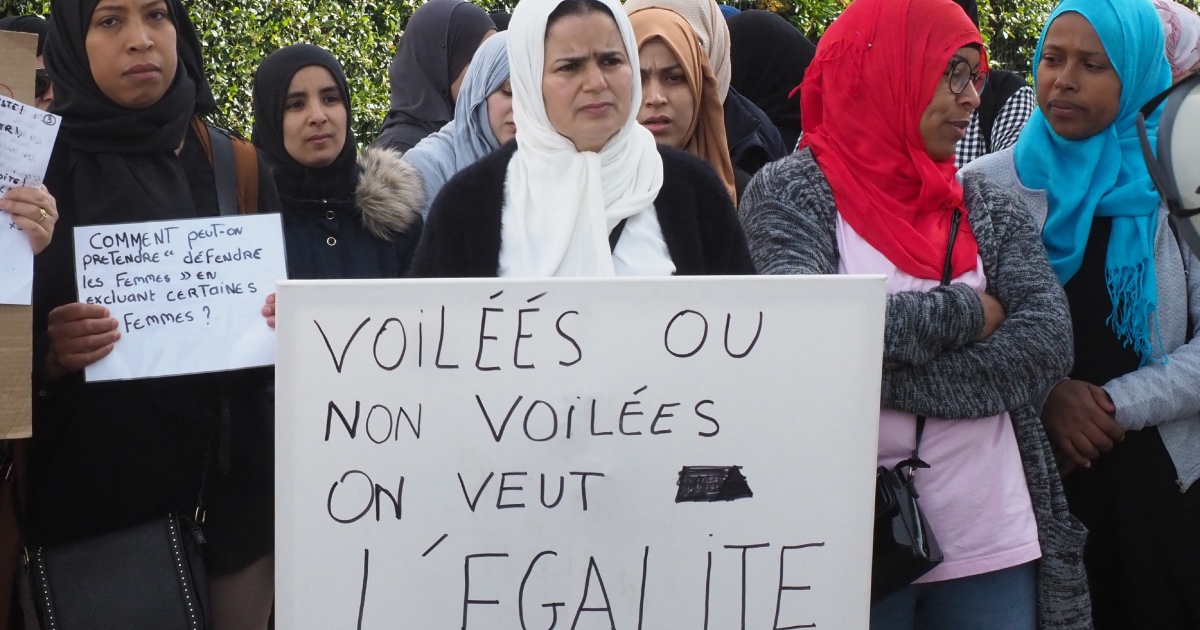
President Macron has defended the existing ban on headscarves in schools while election opponent Marine Le Pen seeks to outlaw coverings outright.
Muslim headscarves took centre stage in France’s presidential campaign amid far-right candidate Marine Le Pen’s push to entirely ban them in the country with western Europe’s largest Muslim population.
Both Le Pen and rival Emmanuel Macron, facing a tightly contested April 24 runoff vote, were confronted by women in headscarves on Friday who asked why their clothing choices should be caught up in politics.
Macron said he would not ban religious clothing, but he has overseen the closure of several mosques and Islamic groups. And many Muslims in France feel the presidential campaign has unfairly stigmatised their faith.
At a farmers’ market in the southern town of Pertuis, a woman in a blue-and-white head covering approached Le Pen as the candidate weaved past fishmongers and vendors to greet supporters.
“What is the headscarf doing in politics?” the woman asked.
Le Pen defended her position calling the headscarf a “uniform imposed over time by people who have a radical vision of Islam”.
“That’s not true,” countered the woman. “I started to wear the veil when I was an older woman… For me it is a sign of being a grandmother.” The woman noted her father served in the French military for 15 years.
Speaking to RTL radio on Thursday, Le Pen explained how her pledge to ban the headscarf in all public spaces would be implemented, saying it would be enforced by police in the same way as seatbelt-wearing in cars.
“People will be given a fine in the same way that it is illegal to not wear your seat belt. It seems to me that the police are very much able to enforce this measure,” she said.
Le Pen’s opposition to the headscarf has encapsulated what her critics say makes her dangerous to French unity by stigmatising millions of French Muslims. If she becomes president, Le Pen said she would also slash immigration and wants to outlaw ritual slaughter, which would restrict French Muslims’ and Jews’ access to kosher and halal meat.
Macron, too, debated a woman in a Muslim headscarf on Friday in a lively exchange on broadcaster France-Info. He sought to distance himself from Le Pen by saying he would not change any laws, but defended an existing ban on headscarves in schools as part of France’s secular principles.
The woman, Sara el-Attar, said she felt insulted by previous comments by Macron when he suggested headscarves destabilise relations between men and women.
French women “have been castigated these recent years for a simple scarf, without any leader deigning to denounce this injustice”, she said.
‘Not an obsession’
El-Attar repeated the argument many veiled women in France make: people mistakenly think they are veiled not through personal choice, but because men make them wear headscarves.
Macron sought to defend his record. “For me personally, the question of the headscarf is not an obsession,” Macron said.
But critics say his government stoked prejudice against Muslims by cracking down on what it has claimed are efforts by some Muslims to carve out spaces in France for stricter interpretations of Islam. The government has gone after some schools, mosques and Islamic associations.
Le Pen, 53, has toned down her anti-immigration rhetoric during campaigning this year and has focused instead on household spending, putting her closer than ever to power, opinion polls indicate.







